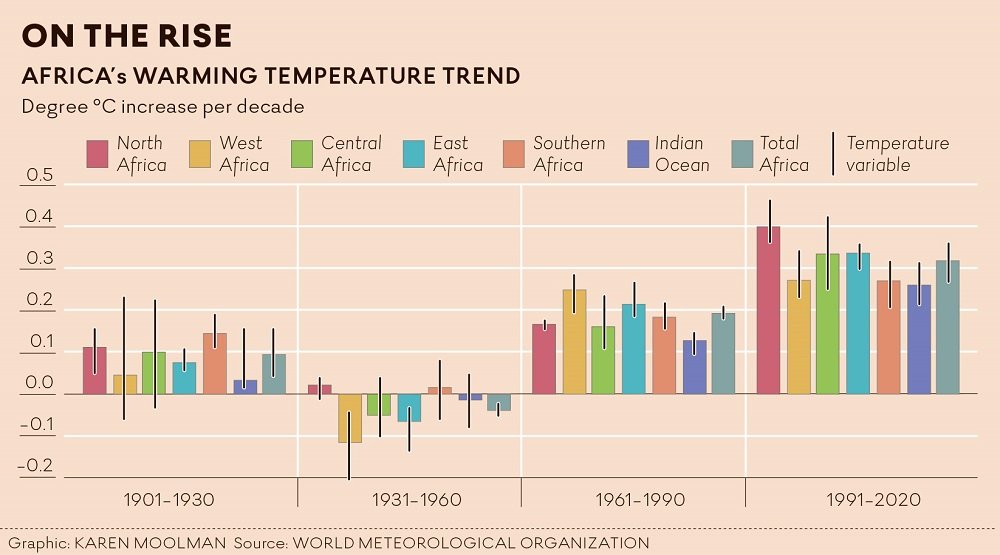Africa must chart its sustainability ambitions at COP27
An FTI Consulting article written by Caroline Park and Dr. Martin Porter
Despite it being the 26th such meeting, 2021’s UN Climate Change Convention’s Conference of the Parties in Glasgow acted as a wake-up call for many to the imminent and enormous danger climate change presents.
Nearly a year on, as we turn our attention to COP27 — the “Africa COP” taking place in Egypt next month — progress on this complex issue remains challenging, despite the increasingly constrained time frame for action.
Natural disasters since COP26, including the seismic floods that ravaged parts of KwaZulu-Natal earlier this year and wildfires across Europe resulting from climate-driven environmental effects, demonstrated the stark difference in the fortunes of developed and developing countries.
Though all these events are disastrous in their own terms, the human impact, particularly on the most vulnerable, has clearly been greater in the developing world. This represents an injustice that is increasingly hard to avoid, especially in the context of wider commitments to the UN’s 2030 sustainable development goals (SDGs).
There is growing recognition that while the developed world has reaped the benefits of the fossil-fuelled development model and global warming emissions, less developed countries are living more acutely with its adverse effects. Denmark’s recent commitment to pay €13.4m to developing countries for loss and damage may be too small to make much difference in itself. However, by becoming the first developed country to do this it is perhaps heralding a much-needed shift in approach that is key if international climate negotiations are to make rapid progress.
Africa contributes less than 4% of greenhouse gas (GHG) emissions globally, according to the communiqué issued after the Egypt International Co-operation Forum and meeting of African ministers of finance, economy and the environment in early September. Yet less than 5.5% of the world’s climate financing flows to Africa.
Pivotal moment
It is precisely those countries that are less able to fund or deploy the resources to invest in the modern infrastructure, energy and other technologies that will provide both high growth, climate resilience and the improved social outcomes they urgently and rightly seek. Unsurprisingly, ensuring the continent has a coherent climate finance position while securing further financing for implementation was top of the forum’s agenda.
We are at a pivotal moment for Africa to define its own sustainability agenda. Its ambitions must pursue opportunities that ensure the continent, its economies and people are at the heart of potential solutions. This means enabling them to be spared the worst effects of climate change, build resilience and be compensated fairly for loss or damage, but also benefit more broadly from the economic and social opportunities of the transition.
Clearly, the journey towards a universal net-zero emissions future by 2050 requires a proactive and collaborative effort. During COP26 we saw glimmers of this when SA was the recipient of $8.5bn from a consortium of developed economies to help in its just energy transition and alleviate its heavy reliance on coal. But realising the potential of this deal will take time, and progress is frustratingly slow. Collectively, there is far more work to do — and quickly.
Proactivity is at the heart of resilience regarding sustainability. In FTI Consulting’s 2022 Resilience Barometer, 88% of G20 companies confirmed that their approach to environmental, social & governance (ESG) issues was evolving from managing the burden of risk to planning around new business opportunities with a longer-term perspective. The key is how companies and the jurisdictions in which they operate will navigate the current landscape to enhance their resilience and turn the ESG agenda to their advantage.
The EU is front-running the world on sustainability standards, especially in finance and ESG regulations. It has stated that it will work with Africa on shared global commitments, such as the 2030 Agenda for Sustainable Development and the Paris Agreement on Climate Change Agenda 2063. Key areas identified by the EU include green growth models, combating climate change, ensuring access to sustainable energy and protecting biodiversity and natural resources.
Africa’s sustainability challenges are significantly different to those of developed markets, and the weighting of ESG has different emphasis for its investors. Moreover, its ambitions will vary and more closely support its socioeconomic development and transition.
Policy adoption
However, with capital so mobile and investors following the international agenda, the continent must champion its own sustainability goals while aligning them with the UN SDGs, especially given that they are linked to its future prosperity and in attracting new international investment.
The following important threads inform policy adoption for the continent’s nations:
African nations must inform policy transformation to establish the foundations to meet their chosen sustainability objectives. Policy must be supportive as a catalyst to enable progress and change.
Policy harmonisation is a necessity as intra-Africa co-operation, regional integration and synergies will enable the continent to present itself more powerfully on the world stage. Responsibility lies with public and private sector collaboration, sovereigns and corporates, working with stakeholders on regulatory compliance and sustainability leadership, allowing for a tangible effect on their value chains.
African nations should optimise global co-operation and work in partnership with entities such as the EU to create sustainability initiatives and common agendas based on shared interest. This requires robust governance and transparency structures that do not deviate from global standards, such as that laid out by the International Sustainability Standards Board (ISSB). Equally, it must not be disadvantaged by principles and frameworks adopted elsewhere in the world.
These components are critical for creating the policy certainty international investors require for capital flows to build new sectors while transitioning to a sustainable economy. The EU is working to include sustainability considerations into every aspect of finance and supporting tangible ESG business transformations to attract investors. Investment policies adopted by our own financial institutions must be conducive to encouraging adaptation towards climate change and climate neutrality, while supporting Africa’s just transition.
African nations must use COP27 to set out a united, positive and convincing vision of their transition path to a climate neutral, sustainable continent, as part of the global effort. They will not have this chance too often again, so they must seize this opportunity to reap the economic benefits as well as the social and environmental ones.
Parker is MD: strategic communications at FTI Consulting SA.
Dr Porter, a senior adviser for sustainability at FTI Consulting, is executive chair of CISL Brussels.


